Distinguished Critique: Superman For All Seasons Review
A remarkable examination of Clark Kent's transformation from boy to Superman
—by Nathan on September 15, 2023—
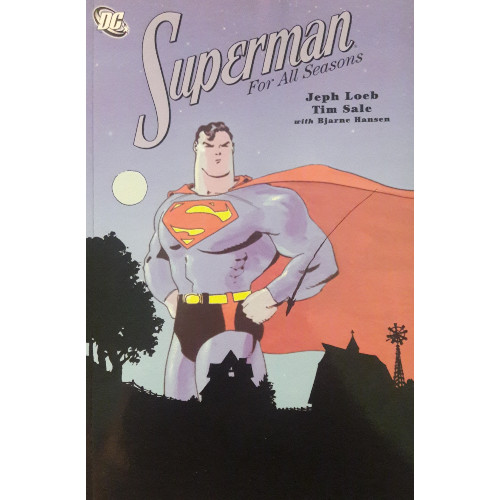
Jeph Loeb and Tim Sale left an indelible mark on the comics world together. Their series Batman: The Long Halloween is considered one of the greatest Batman stories ever told, alongside The Dark Knight Returns, and is this writer’s personal favorite comic of all time. Yet the duo told more than just well-written Batman stories. They touched a myriad of other characters together, including Spider-Man, Daredevil, the Challengers of the Unknown, and Superman.
A few days after artist Tim Sale passed away last year, I sat down and read his and Loeb’s Superman For All Seasons series. What I discovered was a stirringly different Superman series than any other I’d read previously, a gorgeously illustrated, wonderfully written, introspective gaze at the birth of the Man of Steel.
Superman For All Seasons
Writer: Jeph Loeb
Penciler Tim Sale
Inker: Tim Sale
Colorist: Bjarne Hansen
Letterer: Richard Starkings
Issues: Superman For All Seasons #1-4
Publication Dates: September-December 1998
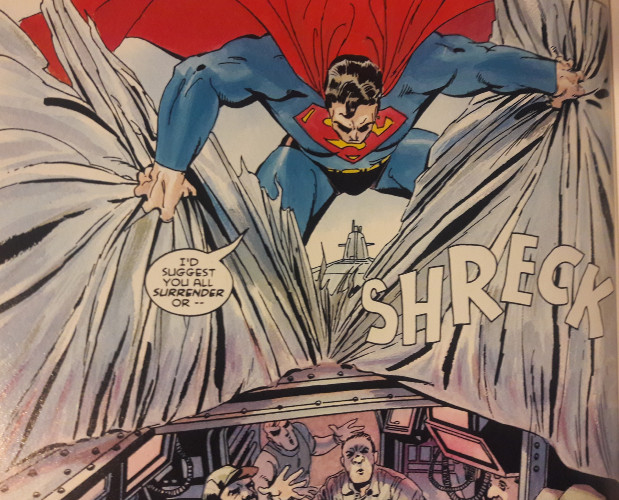
Note: save for some minor edits, this blog is the same as it was when I originally posted it to Hubpages
Several Superman origin stories I’ve read follow some kind of pattern: infant Kal-El is blasted from doomed planet Krypton, found by the Kents in Kansas, raised to use his powers well, and moves to Metropolis to stare down evildoers like Lex Luthor. Loeb and Sale skip the origin completely, instead focusing on a Clark Kent about to graduate high school and deciding which direction he wishes his life to go. He’s on the cusp of manhood, and in wonderful coming-of-age narrative fashion, Loeb and Sale push him firmly into adulthood.
There’s always this sense of "power and responsibility" to Superman that writers latch onto. He’s got all this power, with his strength and invulnerability, that it would almost be selfish for him not to do anything with his uncanny abilities. A sense of "fate" or "destiny" can be found in the work of John Byrne; Mark Millar toys with this concept in Superman: Red Son, having “fate” steer Superman’s destiny in a different direction; in Superman: Birthright, Mark Waid set Clark up as slightly nomadic, traveling the world until he figured which direction he wished to take. It's as if Clark, from birth, has no other decision than to become a superhero.
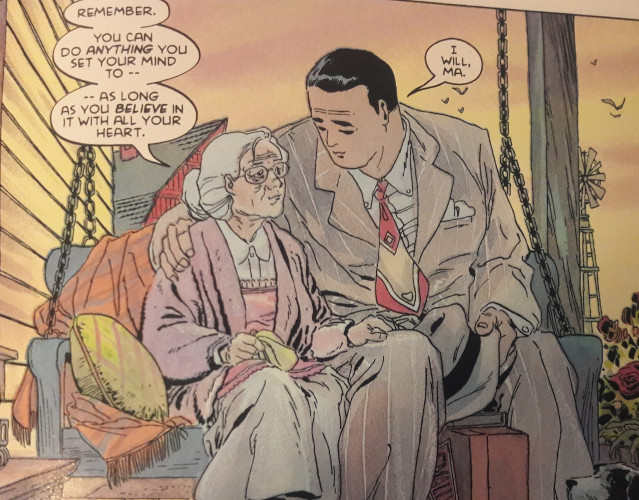
Loeb and Sale’s Superman is guided less by fate–some overpowering, esoteric sense of creeping destiny–and more by his state in life. Now that he’s about to graduate high school, what does he want to do? What does Clark want his life to look like? The series hinges less on concepts of power and responsibility, as if Clark is fated to be a superhero through the simple fact that he has incredible powers, and centers more on Clark’s choices. Sure, he’s reached an age where he can no longer live as a child, but he’s also at a place where he gets to decide what life is going to be for him. The story then, feels less guided by standard Superman lore–as in, Superman has to move to Metropolis, meet Lois Lane, fight Lex Luthor because, y’know, that’s just what Superman does–and allows Clark agency...or, at least, the illusion of agency.
I feel as if Loeb and Sale take some of the bits of Superman’s early days readers take for granted and make them significant. How often do we get a deep gaze into Clark’s years in Smallville, basking in the beauty of his hometown and the fields which surround it? How often do we view Clark, not as Superboy or Superman, but in this transitory state between childhood and adulthood? The first issue sees Clark sneak food to his dog, forget a haircut appointment, outrun a train (in a scene mirroring the first Richard Donner film), help his father with farmwork, relax in bed while petting his dog…in many ways, he’s still young, immature, learning, growing. Loeb and Sale take time to build on his relationships with characters such as his parents, Pete Ross, Lana Lang, and several Smallville inhabitants, all of whom make the community feel vibrant and integral to the story.
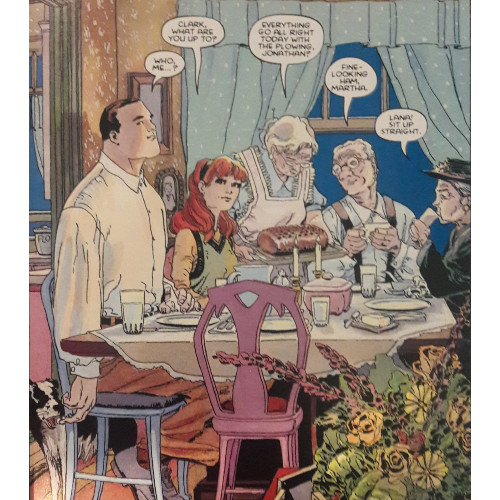
Even in later issues, as Clark moves to Metropolis and embraces his superhuman persona, he frequently returns home. An early defeat at Lex Luthor’s hands leaves him destitute, bringing him back to Ma and Pa Kent’s front porch for guidance. His friendship with Lana Lang forms a narrative avenue through the whole series, dramatically shifting after Clark reveals his powers to her. After a young boy comments on Superman’s costume, the hero replies that his mom made it for him. Little tidbits such as these point to Smallville’s continuing influence on the hero, and deeper still, the Kents’ efforts in raising their son. Loeb and Sale take time to parse through these impacts, never letting readers forget how much the hero retains from his time in his home town.
Lana Lang, Pete Ross, and the Kents all deserve additional analysis in examining the full scope of For All Seasons. Lana’s character is far different than Geoff Johns and Gary Frank’s depiction of her in Superman: Secret Origin, and her reactions towards her best friend’s burgeoning power set feel genuinely human; she grapples with Clark’s sudden revelation–how she handles his powers becomes a focal point for Loeb and Sale’s final issue. Johns and Frank did little with Lana past their first issue, but she becomes a central character in Loeb and Sale’s series.
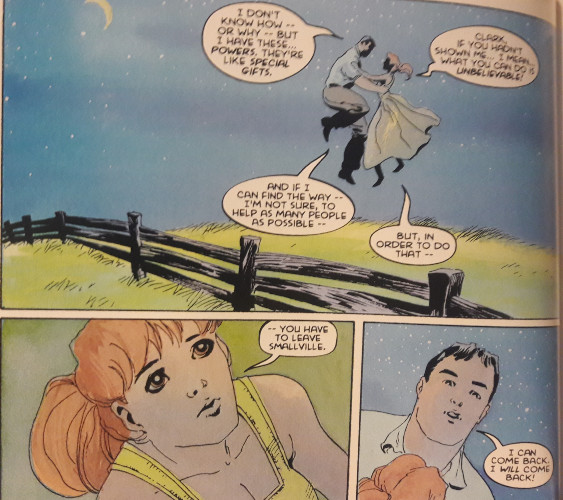
Tension exists between Clark and Lana after his revelation, and the writer/artist duo do well to explore the conflict. Yet Lana offers a different, almost implicit tension for readers–she loves Clark, a childhood crush that she hopes will grow stronger. To any reader aware of current continuity, fans know Superman ultimately marries Lois. But in this coming-of-age story, Loeb and Sale are much less interested in teeing up a Clark/Lois romance and more engaged in exploring Clark’s friendship with Lana, no matter which direction it goes.
Pete Ross becomes an engaging counterpoint to Clark as the series progresses. I know little of Clark’s childhood chum, my only exposure to him through a handful of narratives such as Red Son and Alan Moore’s brief, fatal use of the character in "Whatever Happened to the Man of Tomorrow?" For All Seasons positions him as a young man who knows his plans for post-graduation life. "When that school bell rings for the last time, I’m headin’ into Metropolis on the fastest train I can catch," he tells Clark and Lana. He rubs a miniature elephant head and wishes for a million dollars, much like George Bailey in It’s A Wonderful Life. He views Smallville, not as the source of his development as a young man, but as a prison to escape. How Pete’s story flows from his first appearance also allows the readers to draw parallels to Clark–does he end up in Metropolis? Is his destiny as rosy as he intends? Where Clark debates his future, Pete’s surefire, can-do attitude offers the opposite viewpoint, leaving me to wonder if the young man would be so certain if he possessed Clark’s powers.
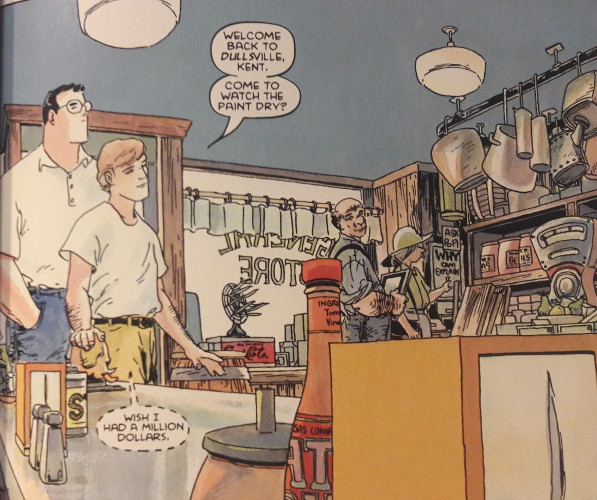
The Kents, as always, form the bedrock of Clark’s beliefs. Jonathan and Martha, to my knowledge, have never had as quotable a mantra as "With great power comes great responsibility" to influence Clark, nor any singular, historic moment, such as the death of the Waynes, to define Clark’s future. Loeb and Sale don’t necessarily attempt to give them one here–their past influence is largely inferred, maintained by Clark’s choices and decisions. The young man is a genuinely kind and caring person, and readers can assume his decisions are based on his upbringing.
In the present, talks between Clark and Jonathan, Clark’s decision to return home in times of need, and even a brief conversation between Martha and Lana all showcase the Kents’ enduring wisdom and kindness. Loeb and Sale don’t weave in any of the Jonathan/Clark conflict Waid infused in Birthright; in fact, other than Clark’s comment on his costume, little indication exists that the Martha and Jonathan in For All Seasons explicitly aid in or steer Clark towards a future as a costumed crime fighter.
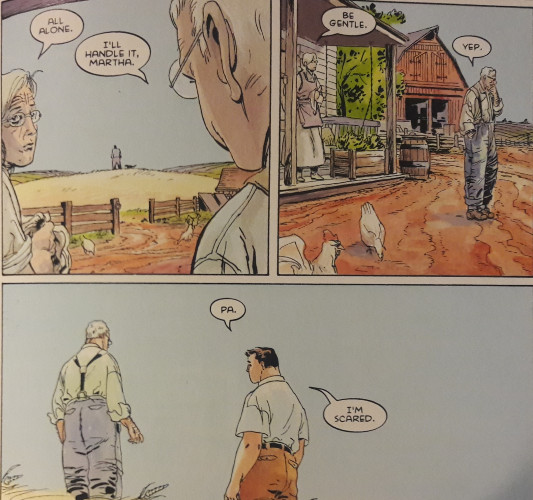
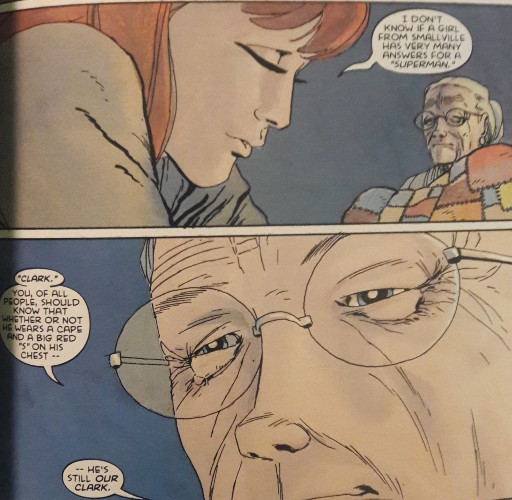
Engagingly, Loeb and Sale’s focus on Smallville uniquely places Metropolis in a more foreign light, as we join a Superman making his appearance known to the city even as Clark finds his way. Lex Luthor is fashioned as a deeply powerful and selfish man, with a grip on the city that Superman threatens. He certainly feels cast in the mold of John Byrne’s take on the character, a savvy businessman who thinks he can control all the comings and goings of Metropolis. Superman offers the one thing he cannot curl his fingers around, and Loeb and Sale dedicate an entire issue to breaching Lex’s brain as he struggles with this superhuman newcomer.
Lois Lane, though one of four narrators in the series (the others being Jonathan, Lex, and Lana), feels subservient to Lana’s position. Loeb and Sale don’t cast her in a particularly unique or different light–she’s still the headstrong reporter, always angling for the most honest headline. I do believe it’s Lana’s stronger presence which limits Lois’ interactions with Superman and the world around him; her last appearance is more of a joke, as she nonchalantly dismisses a brief pet theory about Clark Kent and Superman being the same person.
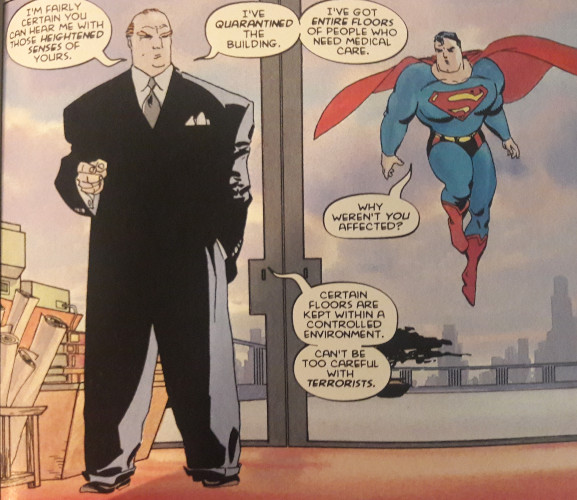
Important as the characters are to the plot and Clark’s development as a person, one cannot read this series without loving Tim Sale’s painted artwork. Beautiful details fill each page, from a Kent household which truly feels lived-in–including a realistically imagined, cluttered front porch, to a warm dining room at dinner–to fantastically-formed faces which convey a bevy of emotions. Continuity plays an important part in Sale’s artistry, with the entire downtown of Smallville feeling intentionally planned out and positioned so story elements make sense (such as when Clark attends a haircut next to a general store and uses his x-ray vision to see into the store–a beautiful little detail). Perhaps my only complaint regarding Sale’s art is his Superman occasionally feels too beefy, appearing somewhat oafish-looking in certain scenes.
And Loeb, though a master storyteller, doesn’t craft every page perfectly. A very loose narrative weaves its way through the entire story, as Clark changes and grows. This culminates in a fiendish plan by Lex Luthor and the brief introduction of a minor new character, all of which leaves Superman defeated. Important as this moment is to the story overall, the scheme feels a tad forced and convenient to Loeb’s theming; the new character, in particular, feels a little wasted, brought in for the necessary plot development and then summarily dispatched. The idea is solid, and the plot brings Clark back to his roots, but the execution of the whole scheme feels lackluster.
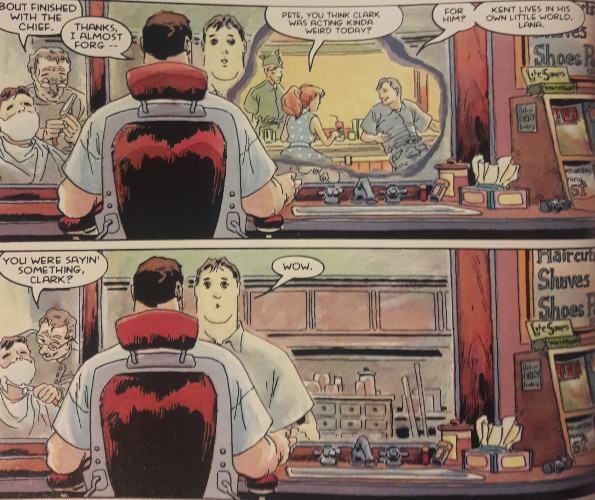
Aside from this wonky plot point, Superman For All Seasons is definitely a contender for "essential Superman stories." Unlike Byrne’s Man of Steel, Waid’s Birthright, or Johns’ Secret Origin, this series feels less like a retelling of Superman’s fabled origin and more a remolding of the Superman character. Here, the influences on Clark’s person are just as important, if not more so, than the super-heroics; here, the world of Smallville is vibrantly brought to life by Sale, forming a real world for Clark to interact with and learn from; here, Jonathan and Martha Kent, Lana Lang, Pete Ross, Lois Lane, and Lex Luthor form not just your regular crew of Superman cast members but real characters with real desires. They reflect Clark just as much as he reflects them, points of light and darkness intended to match or contrast Clark’s growth from a boy into a Man of Steel.